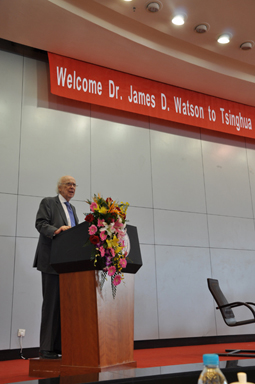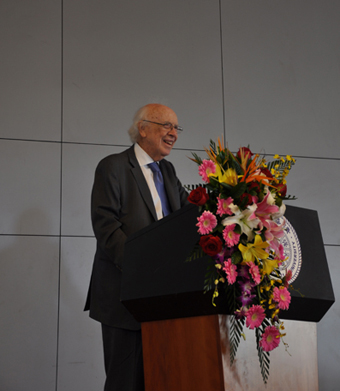By Paul House

Dr. James Watson delivered a speech on practical ways of curing cancer on April 13. Dr. Watson hails from a successful career which includes winning the Nobel Prize in 1962 for his discovery of the molecular structure of DNA. Dr. Watson also headed the prestigious Cold Spring Harbor laboratory.
In his speech Dr. Watson spoke about the need of biochemistry to re-enter the field of cancer research and gave practical examples of how biochemistry can be used to create effective therapies. Notably, biochemistry is needed to discover chemicals which inhibit cell division and thus the spread of cancer. Further, biochemistry can be used to prevent glycolysis (digestion of sugars) by cancer cells. The resultant cells would then starve, killing the cancer.

Departing from biochemistry, Dr. Watson outlined strategies in genetic engineering and molecular biology. Therapies could be created targeting genes that control cell division, cell death (apoptosis), and glycolysis. Further therapies could inhibit the growth of blood vessels that feed malignant tumors, thus starving the tumors to death.
Dr. Watson also detailed practical lifestyle habits which can greatly reduce the risk of cancer. These included having a diet low in sugar and calories, exercise, and taking anti-inflammatory medications.
In the 1970s U.S. President Richard Nixon declared a war on cancer and yet there are still no effective cures. Dr. Watson expressed his frustration at this lack of progress and blamed regulatory hurdles in the U.S. Pharmaceutical and Medical Industries. Dr. Watson condoned the need to prove existing drugs as useless before new trials can be introduced. He also expressed frustration that policy is too concerned with protecting a patient in a clinical trial and not concerned with all the patients currently dying from cancer. In closing Dr. Watson stated: “The time has come to cure cancer. If we don’t do it in the next ten years it is more a failure of human will than science.” Let us hope he is right.
After his speech the floor was opened for questions. One of the most interesting questions asked for advice on becoming a future scientist. Dr. Watson responded that students should strive to attend good schools, make good connections, find good heroes, and find topics they are passionate about. In his words: “Don’t enter a field where most of the questions have been answered, try to find a field where there are many great questions yet to be answered.”
Dr. James Watson met with the Vice Chairperson of Tsinghua University Council, Shi Zongkai, and discussed topics on research and talent cultivation prior to the speech that day.
(Photo by Zheng Pei)

